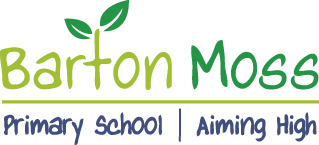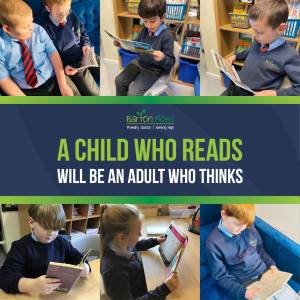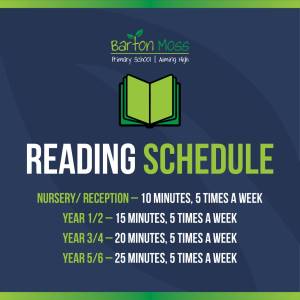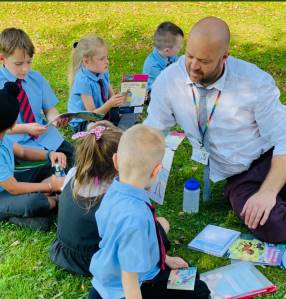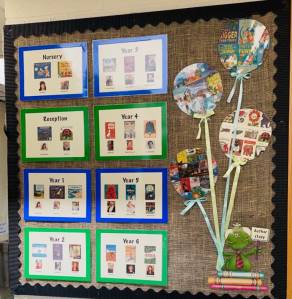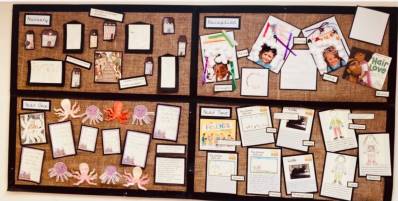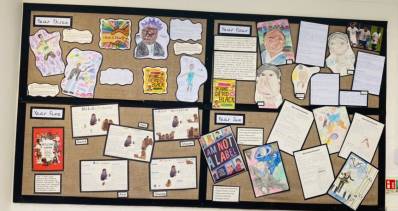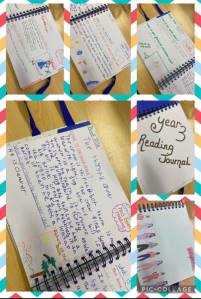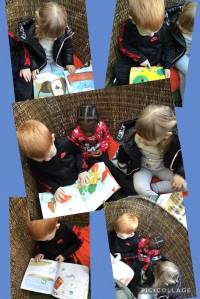Reading

Staff
At Barton Moss School it is our intent that by the end of their primary education, all pupils are able to read fluently, with confidence and passion, in any subject. This is enabled by establishing an environment where reading for pleasure is at the forefront for all pupils, teachers and their parents. We also ensure that all pupils are able to access and acquire knowledge across the curriculum by using their comprehension and inference skills to understand texts – this will deepen their learning in every subject.
Reading
Intent
Literacy Spine
Our curriculum has been developed to address our context and the barriers to learning derived from it. We have a coherent literacy spine from EYFS to Year 6 that reflects this and ensures the gaps identified are our main priority. Our spine includes a wide range of texts, including traditional tales. It supports a comprehensive range of opportunities for reading and writing which systematically develop children’s vocabulary and exposes them to high quality models of grammar and language use. This particularly supports many of our children who arrive with limited vocabulary – especially our EAL children who often arrive at school during KS1 and 2.
It is clear through our literacy spine how important reading is across the curriculum and to children’s future life opportunities. Through our author studies and visits, children are aware that this is a career opportunity that is available to them. Through reading alongside writing they understand the role of the publishers and illustrators and again how this could be a future aspiration.
Our literacy spine shows that there is a clear and defined sequence of literacy development throughout school. Children are deliberately exposed to a wide variety of text types, with a clear progression demonstrated throughout the year groups.
Our reading curriculum ensures that:
By the end of EYFS all children will:
Comprehension
- Demonstrate understanding of what has been read to them by retelling stories and narratives using their own words and recently introduced vocabulary;
- Anticipate – where appropriate – key events in stories;
- Use and understand recently introduced vocabulary during discussions about stories, non-fiction, rhymes and poems and during role-play.
Word Reading
- Say a sound for each letter in the alphabet and at least 10 digraphs;
- Read words consistent with their phonic knowledge by sound-blending;
- Apply phonics through RWI and beyond
- Read aloud simple sentences and books that are consistent with their phonic knowledge, including some common exception words.
- Read for pleasure
- Visit a library each year
- Experience a visit from an author, illustrator and poet each year
End of Key Stage Intentions
By the end of Key Stage 1 all pupils will be able to;
- read for pleasure
- visit a library each year
- experience a visit from an author, illustrator and poet each year
- embed phonics and fluency
- read books written at an age appropriate interest level
- read them accurately and at a speed that is sufficient for them to focus more on understanding
- be able to decode most new words outside their spoken vocabulary, making a good approximation to the word’s pronunciation
- be independent, fluent and enthusiastic readers who read widely and frequently.
- develop their understanding and enjoyment of stories, poetry, plays and non-fiction, and learning to read silently
- develop their knowledge and skills in reading non-fiction about a wide range of subjects
- learn to justify their views about what they have read
By the end of Lower Key Stage 2 all pupils will be able to;
- develop reading for independent learning
- read for pleasure
- visit a library each year
- experience a visit from an author, illustrator and poet each year
- read aloud a wider range of poetry and books written at an age-appropriate interest level with accuracy and at a reasonable speaking pace
- read most words effortlessly and to work out how to pronounce unfamiliar written words with increasing automaticity. If the pronunciation sounds unfamiliar, they should ask for help in determining both the meaning of the word and how to pronounce it correctly
- prepare readings, with appropriate intonation to show their understanding
- summarise and present a familiar story in their own words
- read widely and frequently, outside as well as in school, for pleasure and information
- read silently, with good understanding, inferring the meanings of unfamiliar words, and then discuss what they have read
By the end of Upper Key Stage 2 all pupils will be able to:
- read for pleasure
- visit a library each year
- experience a visit from an author, illustrator and poet each year
- apply their growing knowledge of root words, prefixes and suffixes
- continue to read and discuss an increasingly wide range of fiction, poetry, plays, non-fiction
- make comparisons within and across books, increasing their familiarity with a wide range of texts
- identify and discuss themes and conventions
- learn a wider range of poetry by heart preparing poems and plays
- check that the book makes sense to them, discussing their understanding and exploring the meaning of words in context
- summarise the main ideas
- identify how language, structure and presentation contribute to meaning
- discuss and evaluate authors use of language
- distinguish between statements of fact and opinion
- recommend books that they have read to their peers, giving reasons for their choices
- participate in discussions about books, building on their own and others’ ideas and challenging views courteously
- explain and discuss their understanding of what they have read, including through formal presentations and debates
Non-negotiables
Early Years
- Reading area in and outdoors
- Reading stories at least twice a day
- Children read at home 5 times a week for 5-10 minutes
- Talk 4 Writing every day
- 6 key stories per year group
- Daily phonic session
- Phonics assessed every half term in Reception
- Take home 2 phonics books related to current phonics teaching
- Nursery take home a reading book from Aut 2
- Visit and change library book once a week
- Take home Barton Bear to read and communicate with parents the importance of reading
- Children to read 1:1 with a member of staff at least once a week
- Phonics CPD for teachers weekly
- Red Reading File
- Library visit each year
- Experience a visit from an author, illustrator and poet
KS1
- Reading area in each class
- Reading stories once a day
- Children read at home 5 times a week for 10-15 minutes
- Children to read 1:1 with a member of staff at least once a week
- Year 1 continue T4W
- 6 key stories for each class
- Daily phonics and spelling
- Take home Barton Bear to read and communicate with parents the importance of reading
- VIPERS to start in Y1 Aut 1 verbally
- Phonics assessed every half term
- Reading ages assessed every half term
- In year two spelling strategies begin for those that are off the phonics programme
- Take two books home for reading per week related to phonics or if off the phonics programme related to reading age
- Visit and change library book once a week
- Phonics CPD for teachers weekly
- Red Reading File
- Library visit each year
- Experience a visit from an author, illustrator and poet
- Spelling Shed
- Author studies each term
KS2
- Reading areas in each class
- Children take home a reading book and library book home each day
- Children read at home 5 times a week for 20 mins
- Children to read 1:1 with a member of staff at least once a week
- If child does not read at home, have to read in school
- Continue with VIPERS across fiction and non-fiction
- Class read every day
- Use VIPERS in other subject areas when possible
- Reading and comprehension ages assessed half term
- Non-fiction research sheets to de done weekly (Also known as Non Fiction Friday)
- Red Reading File
- Library visit each year
- Experience a visit from an author, illustrator and poet
- Spelling Shed
- Author studies each term
Implementation
Early Reading and Phonics
In Nursery teachers will plan phase one phonic sessions that develop the children’s sound discrimination skills and following this, teachers in Reception and KS1 will follow the systematic phonic scheme Read Write Inc to teach children their phoneme-grapheme correspondence, as well as the children’s blending skills. The children will be taught in groups of similar phonic decoding abilities daily and each phonic session will follow the same ‘teach, review, practise and apply’ structure.Children will take home decodable books that match the phonics they are doing in class, providing them with the opportunity to practise what they have learnt in school. Teachers will use the school’s Literacy Spine to plan meaningful reading sessions that will increase the children’s love of reading, expose them to a variety of books and develop their comprehension and inference skills.
Reading
Using the school’s Literacy Spine, teachers will plan a series of meaningful reading sessions that will link to the writing outcomes and alongside this, teachers will plan VIPERS sessions to further develop the children’s reading strategies. These VIPERS sessions will also be used in the other subject areas so that children can apply what they have learnt and realise that reading is a tool to help them learn and remember more. Children will take home reading books that will match their reading ages.
Impact
- All monitoring shows that theory and intent is being implemented as planned by the subject leader.
- Pupil voice and surveys show that there is an increase in the number of pupils reading for pleasure
- Monitoring and pupil voice will show that staff know which children are engaged in the reading process
- By the end of EYFS at least 77% will achieve the Reading ELGs
- At least 82% pass the phonic screening test in Y1
- At least 91% pass the phonic screening test in Y2
- By the end of KS1 at least 75% of children will be age related with at least 25% achieving above.
- By the end of year KS2 at least 73% of children will be age related with 27% achieving above.
Downloads
